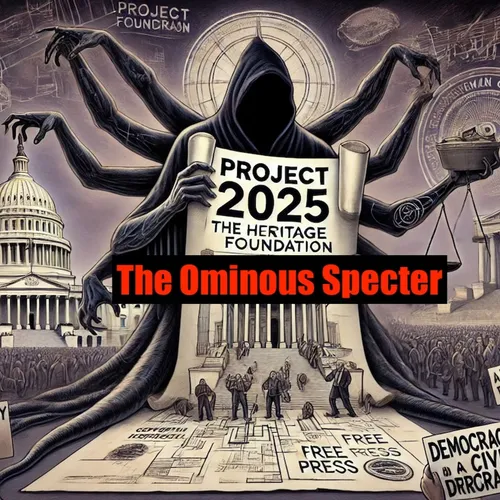Project 2025: Shaping the Future of American Governance
- Author
- Quiet.Please
- Published
- Sat 06 Sep 2025
- Episode Link
- https://www.spreaker.com/episode/project-2025-shaping-the-future-of-american-governance--67657511
Project 2025 began quietly in conservative conference rooms but today stands at the center of a storm over the future of American governance. Born from the Heritage Foundation and assembled by over one hundred right-leaning partners, its 900-page “Mandate for Leadership” lays out not just a governing plan for a future Republican administration, but a wholesale reimagining of the federal government itself. Supporters rally around its stated purpose: as Heritage’s Kevin Roberts says, “We’re going to impose the will of the people through a reinvigorated executive branch.” Critics, however, warn of what the American Civil Liberties Union calls “a blueprint for replacing the rule of law with right-wing ideals.”
One of Project 2025’s boldest proposals is placing the entire executive branch—agencies like the Department of Justice, the FBI, even the Federal Communications Commission—under direct presidential control. The aim, described by Roberts as “ending the era of the ‘independent’ bureaucracy,” is rooted in the controversial unitary executive theory. The project calls for every senior official in the State Department to be replaced by a president’s handpicked loyalists, bypassing the usual Senate confirmation process. Kiron Skinner, who authored the State Department chapter, explained her vision by insisting most career employees are “too left-wing” and must make way for “warriors for the conservative agenda.”
The methods are as consequential as the proposals. Project 2025 revives the idea of “Schedule F,” a bureaucratic mechanism that lets a president reclassify tens of thousands of civil service jobs, stripping long-held protections. The National Federation of Federal Employees warns that by transforming apolitical government roles into political appointments, Project 2025 would make it nearly impossible for career staff to resist pressure or political overreach. As one union leader put it, “Without civil service protections, federal employees will be powerless to stop them.”
The details ripple into almost every corner of American life. A return-to-office mandate for federal workers, for example, upends years of flexible work arrangements, with federal employees ordered back to their offices, often within tight timelines. The Consumer Financial Protection Bureau, an agency created after the 2008 financial crisis to oversee banks and safeguard consumers, is marked for elimination. Agencies like USAID, which manages American humanitarian aid abroad, have already faced drastic cuts and layoffs, with numbers reaching into the hundreds of thousands according to Challenger, Gray & Christmas.
Labor unions also appear squarely in the project’s crosshairs, with proposals to ban public-sector unions, eliminate card check elections, and speed up the process to decertify existing unions. Another core promise is what Project 2025 calls the “restoration of the family.” The authors advocate policies that would restrict abortion, curtail LGBTQ+ rights, and reinforce what they describe as traditional values. According to the project’s summary, the intent is to make the family “the centerpiece of American life,” a phrase that has triggered heated debate over what counts as a family in today’s country.
Some experts warn these moves risk upending critical norms. Legal scholars have voiced concern that Project 2025, if realized, could hurry the erosion of separation of powers, spark legal battles over constitutional rights, and bring about what many label the most extensive centralization of power in the modern era. Detractors have called it a “systemic, ruthless plan to undermine democracy,” while supporters argue it’s a necessary correction to what they see as runaway bureaucracy.
Looking ahead, the nation waits. The next major turning point arrives this November, when voters will decide not only on a president but, indirectly, on whether Project 2025’s policies—already mapped,...
